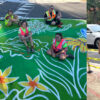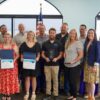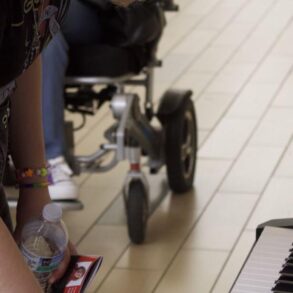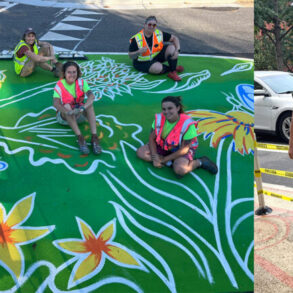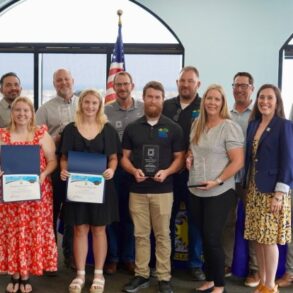Most people probably don’t question what happens to commercial fishing line after it’s used. While some of it is recycled, much of it ends up in landfills or on shorelines.
Founded in 2013 on Kodiak Island, the Alaska Rug Company uses recycled fishing line and rope to craft handwoven rugs, doormats, baskets, rope decor and more. Jen Luton of Sterling bought the online shop last summer.
“One thing that we are really proud of is that we recycle things, so it helps the impact of the local landfill,” she said. “The things that people would just throw out, because they don’t need it anymore, we can actually use and turn it into something that makes money for us, and in turn for our community.”
To craft these products, the company must first track down used fishing line and rope in the community. This requires making connections with local fishermen, while constantly scouting other local sources. The line is then washed and measured before it’s cut into smaller sizes.
“Right away I noticed how special the line was when I started messing around with it, and I started thinking ‘wow, these ropes have been through the waters of Alaska, they’ve caught fish and they’ve experienced something,'” Luton said. “I know it’s an inanimate object, but it kind of feels imbued with magic, and I’m really grateful I get to work with something like that and turn it into something beautiful and useful, a usable piece of art, that will essentially last for a really long time.”
The company, which is co-owned by Luton’s partner Ryan Burnard, also makes custom signs from locally purposed driftwood. In 2019, while still based in Kodiak, Alaska Rug Company represented the state of Alaska at the 3rd Annual Made in America Showcase, a product fair held at the White House. Since the company’s relocation to the Kenai Peninsula, the owners say they’ve seen steady growth.
The online shop gets the majority of its business from the Lower 48, particularly from states like Florida and Texas. Luton says less than 5% of all sales are within the state of Alaska. The couple plans to expand local advertising this spring.

Michaela Wylde
“I think that it’s a really cool product for the area, because even though Kodiak is really tied to the commercial fishing industry, this area is too,” Luton said.
While much of the company’s products are purchased by out-of-state customers, the profits stay local. Luton says that bolsters the local economy and allows her to support other local businesses.
“I hope that people that purchase from us understand that they’re helping us to create art, which is really therapeutic for us both,” she said. “We both really loved learning this new art and craft, and I know it’s something really old that was essentially created by sailors. When I realized one of the knots in mats I had been making was actually a useful piece of equipment on a ship, I was really blown away.”
In addition to the Alaska Rug Company, Luton owns and operates AK Tie Dye, which sells an assortment of tie-dyed products. She says she’ll be selling products from both shops in a combined vendor tent at events like Salmonfest this summer.
Although the company does mostly online sales, you can find products from the Alaska Rug Shop for sale at businesses like The Goods and Localz in Soldotna.
“I hope that people can look at what we make and say ‘wow, they made something out of almost nothing, and it’s really cool,’” Luton said.
The Alaska Rug Shop is actively looking for people interested in donated used commercial fishing line and rope. If you want to donate, be sure to check out Alaska Rug Company on social media.
This post was originally published on this site be sure to check out more of their content


